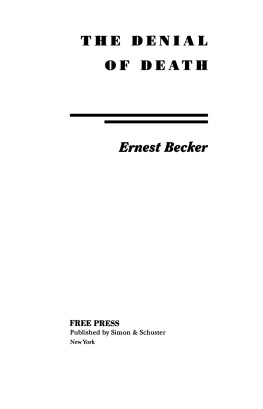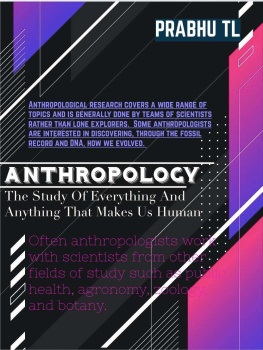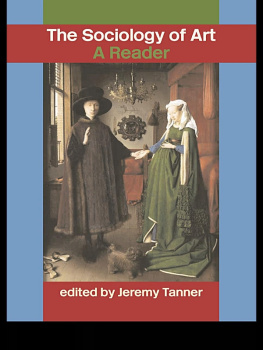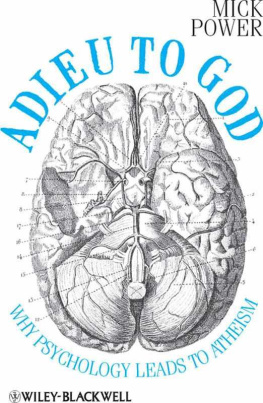
An Interdisciplinary Perspective
on the Problem of Man
Second Edition
by Ernest Becker
THE FREE PRESS
New York London Toronto Sydney Singapore

THE FREE PRESS
1230 Avenue of the Americas
New York, NY 10020
www.SimonandSchuster.com
Copyright 1971, 1962 by The Free Press
All rights reserved, including the right of reproduction in whole or in part in any form.
THE FREE PRESS and colophon are trademarks of Simon & Schuster Inc.
Manufactured in the United States of America
30 29 28 27 26 25 24 23 22 21
ISBN 0-02-902190-1
eISBN-13: 978-1-439-11842-9
CONTENTS
One THE MAN-APES
A Lesson for Thomas Hobbes
Two THE ORIGINS OF THE MIND
The Mechanics of the Miraculous
Three THE DISTINCTIVE HUMAN
The Ego, Language, and the Self
Four THE INNER WORLD
Introduction to the Birth of Tragedy
Five SOCIALIZATION: THE CREATION
OF THE INNER WORLD
Six THE NEW MEANING OF THE
OEDIPUS COMPLEX
The Dispossession of the Inner World
Seven SELF-ESTEEM
The Dominant Motive of Man
Eight CULTURE AND PERSONALITY
The Standardization of the Self-Esteem
Nine SOCIAL ENCOUNTERS: THE STAGING
OF THE SELF-ESTEEM
Ten CULTURE: THE RELATIVITY
OF HERO-SYSTEMS
Eleven WHAT IS NORMAL?
The Convergence of Sociology, Anthropology, and Psychiatry
Twelve WHAT WOULD A SCIENCE OF MAN
THEN BE?The Merger of Social, Psychological,
and Political Theory
Thirteen RELIGION: THE QUEST FOR THE
IDEAL HEROISM
THIS is an ambitious book. In these times there is hardly any point in writing just for the sake of writing: one has to want to do something really important. What I have tried to do here is to present in a brief, challenging, and readable way the most important things that the various disciplines have discovered about man, about what makes people act the way they do. This is the most intimate question that we know, and what I want to do is to present to the intelligent reader that knowledge that the experts themselves get excited about. One curious thing that separates the social from the natural sciences is that the natural sciences, with much fanfare, immediately communicate to the general public their most exciting new ideas: the social sciences tend to nurse their significant insights in scholarly oblivion. As a result people feel that the social sciences are not doing anything important or exciting. But the opposite is true: probably the most thrilling and potentially liberating discoveries have been made in the fields of anthropology, sociology, psychology, and psychiatry. The result is that we are today in possession of an excellent general theory of human nature, and this is what I want to reveal to the reader.
But we have also known for a long time that one of the reasons the social sciences work in oblivion is that they are not getting at knowledge that instantly makes people feel powerful and satisfied, that gives them the sense that they are taming their world, taking command of its mystery and danger. The science of man is the science of mans knowledge about himself: it gives a chill in addition to a thrillthe chill of self-exposure. We may be the only species in the universe, for all we know, that has pushed self-exposure to such an advanced point that we are no longer a secret to ourselves. As we will see in these pages the exposure of this secret is in many ways very unsettling, very anxiety-causing. If we could become comfortable with this knowledge and make it the general property of large masses of voters and their political representatives there is no doubt that we would probably become one of the wisest planets in the universeat least of our form of life, and we would deserve our species title Homo sapiens, Man the Wise. We have a long and improbable way to go to accomplish this personal and political task, but my ambition in writing this book is nothing less than to contribute some small bit to that staggering end: an easily graspable synthesis of what we must know about ourselves if we are to deserve our name.
In its original form this book was a series of lectures to residents in psychiatry, given by a fresh Ph.D. in anthropology. Now, in this new, extended, and almost wholly revised edition I have been able to draw on another decade of experience as a teacher trying to get at essentials and to make them clear and challenging. This book is written for a wider audience and it draws on a wider spectrum, including religion. One of the main characteristics of this new edition is that I have been able, finally, to make my peace with Freud and to come to terms with what is vital in Freudian theory. In the original edition I spent much time firing volleys at Freuds instinct theory only to learn as I pressed my study further that the battle had long since moved on and that others had long ago carried the day that I was so hotly contesting. I was left red-faced but wiserwhich sums up the whole experience of scholarship anyway.
The whole of modern psychiatry and psychoanalysis itself has moved sagaciously beyond Freud, in the familiar names of Alfred Adler, Wilhelm Reich, Otto Rank, Kurt Goldstein, Harry Sullivan, Karen Horney, Erich Fromm, Ludwig Binswanger, Medard Boss, F. Buytendijk, J. H. van den Berg, Viktor Frankl, Ronald Laing, and now, Frederick Perls. This has made Freudian psychology a truly organic part of the general movement of ideas, tying it into the work of William James, James Mark Baldwin, Dewey, and even lesser-known thinkers like F. M. Alexander. What was accomplished in this merger was to get the total human organism back into the theory of the workings of the mind, so that the early functional psychology and the psychoanalytic and existential psychology are now one. This is a crucial historical achievement not only as a linkage of the history of ideas but also as a secure platform for future work: what is there now left really to argue about? We are in possession of a mature scientific psychology that, as I hope to show in these pages, is the most powerful critical weapon that we have for the potential freeing of men.
There are two thinkers above all to whom I personally feel specially indebted for this mature psychology and whose vital work I had previously slighted to the real detriment of my own. One of them, Erich Fromm, is well known but I think that his carefully wrought and cumulative work has not yet been sufficiently appreciated for what it is and for how centrally it stands in the Enlightenment tradition. The other thinkerOtto Rankis today almost wholly neglected, and this new edition represents only a first reflection of my ridiculously belated discovery of his breathtakingly brilliant work. Rank truly is the brooding genius in the wings of Psychoanalysis, and we have only just begun to hear from himfor example, in the work of Robert Jay Lifton. I am not trying to absolve myself of brash ignorance, but there is something perverse about our university education when it fails to show us the authentically cumulative tradition of thought. We have to discover the vital thinkers on our own and accidentally; our teachers, if anything, pooh-pooh the very people we should be studying, and we spend needless years just randomly and with luck coming into our own heritage.
Next page






